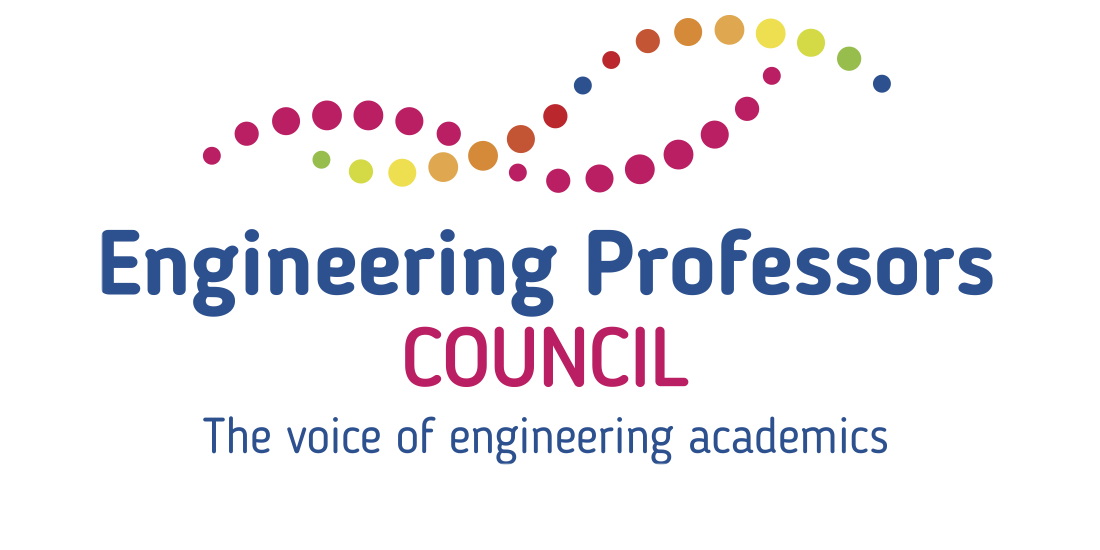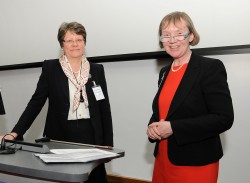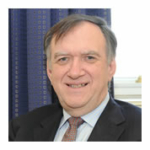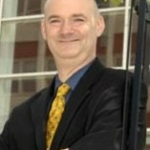
Engineering Professors’ Council Annual Congress 2012
 The Engineering Professors Council Annual Congress 2012 took place at the University of Leicester on 17/18 April 2012.
The Engineering Professors Council Annual Congress 2012 took place at the University of Leicester on 17/18 April 2012.
Themes included the REF, SIVS, employability of graduate engineers and the new funding regime.
The Distinguished Guest Lecture was given by Professor Julia King CBE, Vice Chancellor of Aston University, and this was followed by the Congress Dinner at the Belmont Hotel, on the evening of 17th April.
Please see the detailed schedule for this event, below
Tuesday 17th April
Opening
Session 1
Session 2
Session 3
Wednesday 18th April
Session 1
Session 2

Helen joined Cranfield University as Pro-Vice-Chancellor of the School of Aerospace, Transport and Manufacturing in September 2017. She was previously at the University of Leicester where she was Head of the Department of Engineering between 2012 and 2016, chaired the £17M project to rebuild the Percy Gee Students' Union and served as Graduate Dean. Helen was the first woman President of the Engineering Professors’ Council (the body which represents Engineering in universities throughout the UK) in its fifty year history and has also served as a Vice President and Trustee of the Royal Academy of Engineering.
In 2010 she won a national award as a Woman of Outstanding Achievement in Science, Engineering and Technology for ‘Leadership and Inspiration to Others’. Helen is a Fellow of the Institution of Materials, Minerals and Mining and a Fellow of the Institution of Mechanical Engineers. She has served on the Skills Panel of the Institution of Engineering and Technology (one of the world’s largest Engineering institutions), the Engineering Leaders Panel of the National Council for Universities and Business, and for five years was Chair of the Education and Skills Committee at the Royal Academy of Engineering.
Helen chairs the ‘This is Engineering’ Engineering Talent Project for the Royal Academy, a major campaign which aims to encourage more young people to consider Engineering as a career. Until recently Helen served on the Strategic Facilities Advisory Board for the £200M Sir Henry Royce Institute, a major UK Government Materials Research Initiative, and was a member of the UK Advanced Materials Leadership Council reporting to the UK Government Department for Business Innovation and Skills on national priorities for Materials Research. She was made CBE in the Queens New Year’s Honours 2014 for services to Engineering and Education.
In 2010 she won a national award as a Woman of Outstanding Achievement in Science, Engineering and Technology for ‘Leadership and Inspiration to Others’. Helen is a Fellow of the Institution of Materials, Minerals and Mining and a Fellow of the Institution of Mechanical Engineers. She has served on the Skills Panel of the Institution of Engineering and Technology (one of the world’s largest Engineering institutions), the Engineering Leaders Panel of the National Council for Universities and Business, and for five years was Chair of the Education and Skills Committee at the Royal Academy of Engineering.
Helen chairs the ‘This is Engineering’ Engineering Talent Project for the Royal Academy, a major campaign which aims to encourage more young people to consider Engineering as a career. Until recently Helen served on the Strategic Facilities Advisory Board for the £200M Sir Henry Royce Institute, a major UK Government Materials Research Initiative, and was a member of the UK Advanced Materials Leadership Council reporting to the UK Government Department for Business Innovation and Skills on national priorities for Materials Research. She was made CBE in the Queens New Year’s Honours 2014 for services to Engineering and Education.

Consultant to the Royal Academy of Engineering.
A Mechanical Engineer by training, Dr Ruth Graham specialised in aeronautical fatigue, working with BAE SYSTEMS for a number of years. In 2002 she moved to Imperial College London and later became Director of the EnVision project, which sought to transform the undergraduate education across the universtity’s Faculty of Engineering.
Ruth has worked as an independent consultant since 2008. Her work is focused on fostering change in higher education across the world, helping to improve teaching and learning worldwide. Ruth’s recent projects have included:
•a global initiative to improve the reward and recognition of teaching in higher education that is now supporting reform to academic career pathways at over 50 universities worldwide (www.advancingteaching.com);
•a global study on the lessons learnt from the current period of ‘emergency teaching’ resulting from the COVID-19 pandemic and how this might impact the trajectory of engineering education in the future (www.ceeda.org);
•a cross-institutional and multi-year survey to capture and track the culture and status of teaching amongst faculty, in which 21 universities from 10 countries are participating (www.teachingcultures.com).
Further details can be found on Ruth’s website – www.rhgraham.org – which provides an outline of recent projects as well as copies of her published reports.
A Mechanical Engineer by training, Dr Ruth Graham specialised in aeronautical fatigue, working with BAE SYSTEMS for a number of years. In 2002 she moved to Imperial College London and later became Director of the EnVision project, which sought to transform the undergraduate education across the universtity’s Faculty of Engineering.
Ruth has worked as an independent consultant since 2008. Her work is focused on fostering change in higher education across the world, helping to improve teaching and learning worldwide. Ruth’s recent projects have included:
•a global initiative to improve the reward and recognition of teaching in higher education that is now supporting reform to academic career pathways at over 50 universities worldwide (www.advancingteaching.com);
•a global study on the lessons learnt from the current period of ‘emergency teaching’ resulting from the COVID-19 pandemic and how this might impact the trajectory of engineering education in the future (www.ceeda.org);
•a cross-institutional and multi-year survey to capture and track the culture and status of teaching amongst faculty, in which 21 universities from 10 countries are participating (www.teachingcultures.com).
Further details can be found on Ruth’s website – www.rhgraham.org – which provides an outline of recent projects as well as copies of her published reports.

Professor Julia King CBE, FREng (now Baroness Brown of Cambridge DBE FREng FRS) is an engineer, with a career spanning senior roles in industry and academia, including Vice Chancellor of Aston University from 2006 to 2016.
Her current interests include climate change and the low carbon economy. She serves as: Vice Chair of the Committee on Climate Change and Chair of the Adaptation Committee; Chair of the Carbon Trust; non-executive director of the Offshore Renewable Energy Catapult; Council member of Innovate UK. She led the King Review for the Treasury on decarbonising transport (2008), and is Sector Champion for the Offshore Wind Sector Deal as part of the Government’s Industrial Strategy. She is passionate about education and engineering.
She was a member of the Browne Review on university funding and Lord Stern’s review of the Research Excellence Framework. She chairs STEM Learning Ltd., providing science teacher CPD; and the Henry Royce Institute for Advanced Materials. She is a Fellow of the Royal Academy of Engineering and the Royal Society, and was awarded DBE for services to higher education and technology. Baroness Brown sits as a Crossbench Peer, and is a member of the House of Lords European Union Select Committee.
Her current interests include climate change and the low carbon economy. She serves as: Vice Chair of the Committee on Climate Change and Chair of the Adaptation Committee; Chair of the Carbon Trust; non-executive director of the Offshore Renewable Energy Catapult; Council member of Innovate UK. She led the King Review for the Treasury on decarbonising transport (2008), and is Sector Champion for the Offshore Wind Sector Deal as part of the Government’s Industrial Strategy. She is passionate about education and engineering.
She was a member of the Browne Review on university funding and Lord Stern’s review of the Research Excellence Framework. She chairs STEM Learning Ltd., providing science teacher CPD; and the Henry Royce Institute for Advanced Materials. She is a Fellow of the Royal Academy of Engineering and the Royal Society, and was awarded DBE for services to higher education and technology. Baroness Brown sits as a Crossbench Peer, and is a member of the House of Lords European Union Select Committee.

Prof Stephanie Haywood CEng, FIET, FIoP is Emeritus Professor of Optoelectronic Engineering at the University of Hull and Honorary Treasurer of EPC. From 2010-2015, she was Director of the Centre for Adaptive Science and Sustainability (CASS), an industry-focussed research centre, with a broad remit, working on renewable energy and low carbon projects including offshore wind and energy from waste. In this role, she worked with the Spencer Group through a Royal Academy of Engineering secondment, to develop links between industry and academia in both research and teaching.
Prior to the role with CASS, Stephanie was Head of Engineering and Deputy Dean for Research in the Faculty of Science & Engineering at Hull and served on the board of HETA (Humberside Engineering Training Association), which trains apprentices for major companies. Stephanie’s own research expertise is in the physics and design of optical detectors, modulators and solar cells particularly in the mid IR. She has experience of working in a broad range of academic institutions in the UK and Europe (including UCL, University of Oxford, Middlesex University, Katholieke Universiteit Leuven and IMEC, Belgium). She has also worked in industry for Lucas Advanced Engineering (now TRW).
Stephanie was a member of the REF2014 Sub Panel UoA 15 for General Engineering. A former Chair of PHEE for several years, she was EPC President from 2015-2017.
Prior to the role with CASS, Stephanie was Head of Engineering and Deputy Dean for Research in the Faculty of Science & Engineering at Hull and served on the board of HETA (Humberside Engineering Training Association), which trains apprentices for major companies. Stephanie’s own research expertise is in the physics and design of optical detectors, modulators and solar cells particularly in the mid IR. She has experience of working in a broad range of academic institutions in the UK and Europe (including UCL, University of Oxford, Middlesex University, Katholieke Universiteit Leuven and IMEC, Belgium). She has also worked in industry for Lucas Advanced Engineering (now TRW).
Stephanie was a member of the REF2014 Sub Panel UoA 15 for General Engineering. A former Chair of PHEE for several years, she was EPC President from 2015-2017.

University of Leicester

University of Manchester

Teesside University
UCAS
The University of Cambridge Colleges
QAA for Higher Education
HEFCE
Universities UK (UUK)
EPSRC
University of Surrey
University of Manchester
Higher Education Academy
University of Portsmouth
Engineers Without Borders
This content is for registered users only. Please login.
Subscribe
Login
Please login to comment
0 Comments
Oldest



